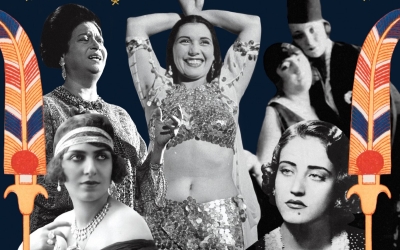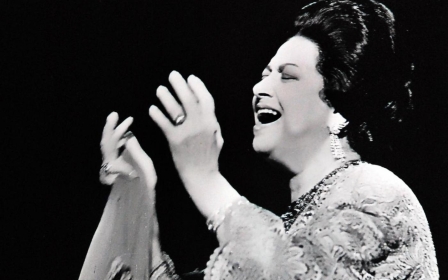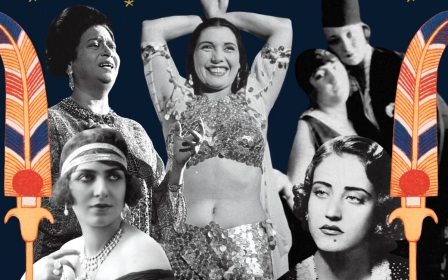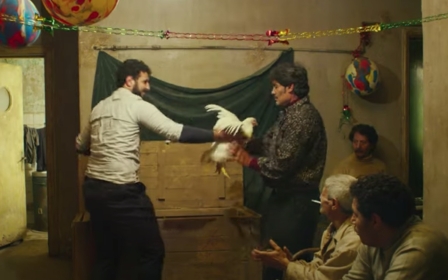Divas of the Middle East: The women who left a musical mark on the region
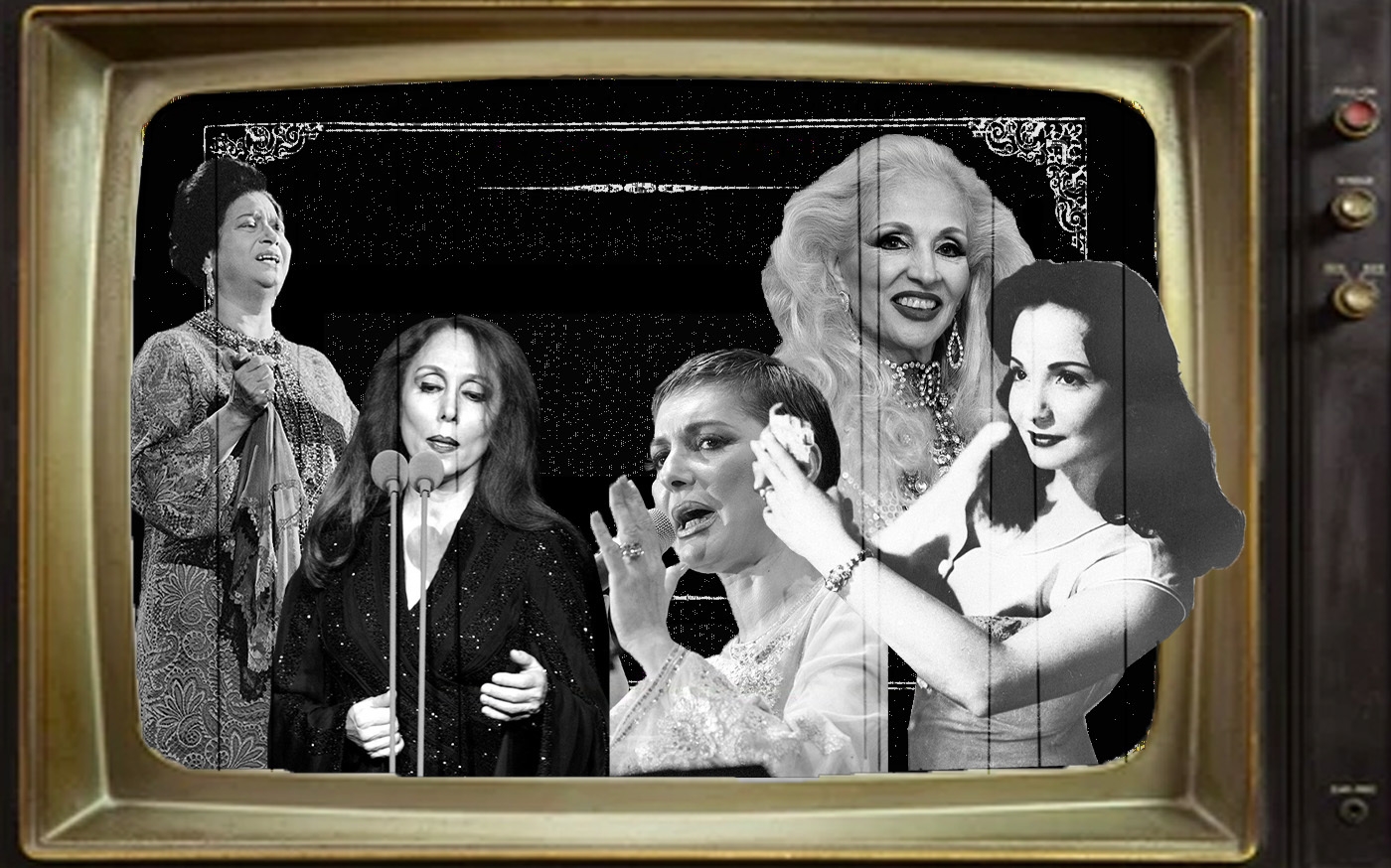
The Middle East and North Africa have a rich musical heritage that is in no small part due to its female entertainers.
Today, they are remembered in exhibitions, inspire cover versions of their classics, and present an archetype for the successful performer that persists to this day.
New MEE newsletter: Jerusalem Dispatch
Sign up to get the latest insights and analysis on Israel-Palestine, alongside Turkey Unpacked and other MEE newsletters
These artists were pioneers in a number of ways. They defined the way their art was perceived and used their work to influence politics.
Many of them remain hugely popular today, decades after they ascended to stardom.
Middle East Eye profiles some of the region's most famous divas here:
Umm Kulthum
Umm Kulthum was born Fatima Ibrahim el-Sayyed in a village in the Nile Delta in 1898 and would go on to become arguably the most famous Arab singer of the 20th century.
Known for her vast vocal range, the singer was given a number of nicknames, including the Fourth Pyramid, Kawkab al Sharq (Planet of the East), and El Sitt (The Lady).
As a child, her father, a religious scholar, would dress her up as a boy and get her to recite religious songs at gatherings because the idea of a girl singing was frowned upon among his conservative peers.
As her reputation developed, Umm Kulthum went to Cairo and performed in front of larger audiences. She also collaborated with prestigious musicians and lyricists during the early 1920s.
Her story represents the classic transformation tale of a country girl turning into a glamorous singer.
Umm Kulthum’s songs contained themes that touched on issues like national politics, love, and her hopes for the future of Egypt and the region as a whole. Many of her songs, which often contained verses of poetry, were patriotic, earning her plaudits from the elite.
During the Suez Canal crisis in 1956, when Britain and France invaded the Sinai with the hopes of upending Gamal Abd el Nasser's nationalist agenda, Umm Kulthum sang Wallah Zaman Ya Selahy (It’s been a long time, oh my weapon), which became Egypt’s national anthem until 1979.
Umm Kulthum’s music has often been referred to as a form of soft power, as Gamal Abdel Nasser used her to galvanise support during difficult periods. Nasser would often make political speeches straight after Umm Kulthum’s songs were broadcast on radio.
The singer's music is often described as an example of 'tarab', an Arabic word used to describe the emotional impact music evokes in an individual. Some define it as the feeling of ecstasy, or the trance-like state brought about by engaging in the song. The genre of music carries with it spiritual connotations and is aimed at carrying listeners away from reality.
Recording over 300 songs in a career that lasted for six decades, Umm Kulthum had a huge cultural impact. Her songs could last anywhere between 45 minutes to three hours and some of her performances lasted up to five hours. The artist also later ventured into film, starring in six productions.
She died in 1975 of kidney failure and her funeral procession brought four million Egyptians onto the streets.
Fairouz
Lebanese singer Fairouz, born Nuhad al-Haddad, is one of the most celebrated Arab singers of the 20th century.
Born in Beirut in 1934, Fairouz’s singing talents were discovered in her teens, when she was discovered by a musician named Mohammed Fleifel.
She later acquired the nickname Fairouz, Arabic for turquoise, after her first performance on Radio Lebanon in the late 1940s.
It was at the radio station that she met famous composers the Rahbani brothers and started to collaborate with them, later marrying Assi Rahbani in 1954.
Born to Christian parents, Fairouz did not explicitly take any sides during the Civil War (1975-1990), earning her the respect of Lebanese people from across the sectarian divides.
Fairouz was further praised for staying in Lebanon during the civil war at a time where many fled to safety.
Beyond Lebanon’s borders, the singer is respected across the Arab world for her support of the Palestinian cause, releasing the songs Raji’un (We are Returning) in 1955 and Al Quds al-Atiqah (Old Jerusalem), following the Six-Day War of 1967.
Warda
Known as Warda al Djazairia (Warda the Algerian) or the Algerian Rose, Warda was born in 1940 in Paris to an Algerian father and Lebanese mother.
After singing songs by Umm Kulthum and Farid al-Atrash at family gatherings, she was scouted by Ahmed Hachlef, a producer for a French radio station, who later featured her on a show aimed at young North Africans.
Warda was noted for mixing classic Lebanese and Egyptian influences with North African ones in her performances and for her songs paying tribute to independence fighters in their struggle against French imperialism.
Lyrics to her songs explored themes as diverse as melancholia, love, patriotism, and were written in a number of Arabic dialects.
The singer eventually moved to Cairo, marrying one of the region’s best-known composers, Baligh Hamdy.
Former Egyptian President Gamal Abdel Nasser requested that Warda be cast in a pan-Arab opera to perform the song Al Watan al Akbar (The Greater Nation).
However, Warda’s mixing of music and politics caused controversy at times. Nasser's successor Anwar al-Sadat banned Warda from performing on stage after she sang in support of Libya’s Muammer Gaddafi during his conflict with Egypt.
Like other Middle Eastern divas, Warda also dabbled in cinema, taking on lead roles in several Egyptian films.
Warda’s songs later took on a renewed significance during Arab Spring uprisings, with songs such as Esmaouni (Listen to Me) being adapted into calls for freedom and democracy.
When Warda passed away in May 2012, aged 72, tributes poured in from mourners around the world. Her fans lined up for hours in Algiers to say their goodbyes to the singer at the Palace of Culture, where her coffin was displayed.
Googoosh
Iranian singer Googoosh, real name Faegheh Atashin, was recognised for her talents at a young age when she would perform in small gatherings.
Her career developed during the 1960s but came to a halt after the Islamic Revolution of 1979, after which the singer continued to live in Iran but was banned from performing.
She was known for mixing Persian pop music with Western rock, as well as Arabic-style string instruments.
Her distinctive style of fashion, featuring short skirts and a short haircut, was emulated by fans, but the revolutionary government did not approve.
Despite being banned from performing in Iran, recordings of her music and videos of her were still widely watched and listened to by a loyal fanbase in the country.
The crackdown on pop music in Iran did not completely end her career, as Iran under President Mohammad Khatami allowed her to perform internationally and she was granted a passport in 2000. Some of the countries she performed in include Canada, Turkey, Australia, and Germany.
Googoosh has been outspoken in her political opinions, expressing her support for protests that have gripped the country in recent years provoking a heavy government clampdown.
“The only thing I want is for the terrorist regime of the Islamic Republic to leave Iran and Iranians in peace,” she said in an interview last year.
Sabah
Sabah’s vibrant blonde curls, unwaveringly strong voice, and film star good looks made her one of the most celebrated divas and cultural icons of the Middle East.
Born Jeanette Gergis al-Feghali in Lebanon, fans nicknamed her ‘al oustoura’ (the Legend) and Sabbouha, a playful twist on her name.
The singer shot to fame in the early 1950s, when she featured in a number of Egyptian films but she released her first song in 1940, at the age of 14.
Known for her collaborations with one of Egypt’s most famous composers, Mohammed Abdul-Wahhab, the Lebanese star was also notable for her mastery of the mawwaal, a genre of traditional Arabic music that is slow, often elongated, and sentimental. A mawwal is often described as poetry that is sung.
She was also one of the first Arab artists to perform internationally, including in London, New York, Paris, and Sydney.
Her songs explored themes of love and sadness, while her roles in films were often in the detective and romance genres.
Sabah pushed the boundaries of what was deemed appropriate at the time and the performer spoke frankly about her nine marriages, including one with Egyptian actor Rushdi Abaza, as well as her cosmetic surgery procedures.
During her career, which lasted over 60 years, Sabah released over 50 albums and acted in over 90 films. She died in November 2014, aged 87, at her home in Beirut.
Shadia
Egyptian actress and singer Shadia starred in over 100 films and recorded hundreds of songs during a career that spanned decades.
Born Fatimah Shaker, Shadia's career kicked off in the 1940s and she quickly established a reputation for her romantic and playful nature, which she showcased in her performances both on film and in song.
Nevertheless, critics called her the 'chameleon of cinema' for her ability to take on roles in which she played powerful assertive women, as well as others in which she took on more submissive characters.
According to some accounts, Shadia fell into her career by accident. Her father Ahmed Kamal Shaker, an agricultural engineer, signed her up for an acting competition when she was aged 16, and she was later scouted by a film director.
Fans were besotted with Shadia’s voice, especially as she sang in an Egyptian dialect with lyrics that dropped classical pretensions.
Many of Shadia's songs remain popular today, especially her patriotic anthem Ya Habibti Ya Masr (Oh my Beloved Egypt).
Shadia later left the entertainment industry in the 1980s after deciding to concentrate more on her religious faith. She died in November 2017 at the age of 86.
Muzeyyen Senar
Senar was born in 1918 in a village in the Bursa region of Turkey. As a young girl, she would accompany her mother to gatherings where she would recite the Quran and classical poems that honoured the Prophet Muhammad.
When her mother left her father and moved to Istanbul, Senar accompanied her and joined a school where a music teacher encouraged her to pursue singing as a career.
Working with prominent musicians as a teenager, by the 1930s Senar started singing on radio stations in Istanbul, quickly building up a vast fanbase.
Senar’s voice has long been praised for its powerful melody, volume, and her ability to incorporate classical music into her songs.
According to some accounts, her talent was also admired by the founder and first president of the Turkish Republic, Mustafa Kemal Ataturk, who invited her to sing at his personal residence despite his later-rescinded ban on Ottoman classical music.
Some of her most famous songs include Benzemez Kimse Sana (Nobody Like You) and Ben Seni Unutmak Icin Sevmedim (I didn’t love you only to forget you).
Many credit Senar with heralding a new era of Turkish classical music and her talents were recognised beyond her country's borders, headlining at nightclubs and concerts internationally.
Senar died in Feburary 2015, aged 97, and was buried at Istanbul's Zincirlikuyu cemetery.
Asmahan
Although born in Syria, legendary singer Asmahan (birth name Amal al-Atrash) made her name in Egypt. Born in 1918 to a famous Druze family known for its resistance to French colonial rule.
Asmahan was the younger sister of the singer Farid al-Atrash, who is also widely regarded as one of the Arab world's best singers.
The pair came from a family with a rich musical pedigree, as their mother was also a trained singer and oud player, who encouraged her children to pursue music as a career.
Asmahan started off performing covers of Umm Kulthum songs and attained success in her early teens, performing at the Cairo Opera House at the age of 14.
Like many other singers at the time, Asmahan’s songs included nationalist themes and praised the Egyptian royal family, which helped accelerate her career.
Asmahan quickly became known for her independent streak and willingness to break taboos. She was a heavy smoker and a drinker, and filed for divorce when her husband asked her to adopt a more reserved and conservative lifestyle.
Her life also included forays into espionage, first working with the British and Free French in the Second World War in order to convince Druze fighters not to take up arms against the allies, then trying to make contact with the Nazis when the allied promise of Syrian independence failed to materialise.
She died aged 27 in a car crash that spurred rumours of foul play, including speculation that there was a link to her spying activities.
Middle East Eye delivers independent and unrivalled coverage and analysis of the Middle East, North Africa and beyond. To learn more about republishing this content and the associated fees, please fill out this form. More about MEE can be found here.


